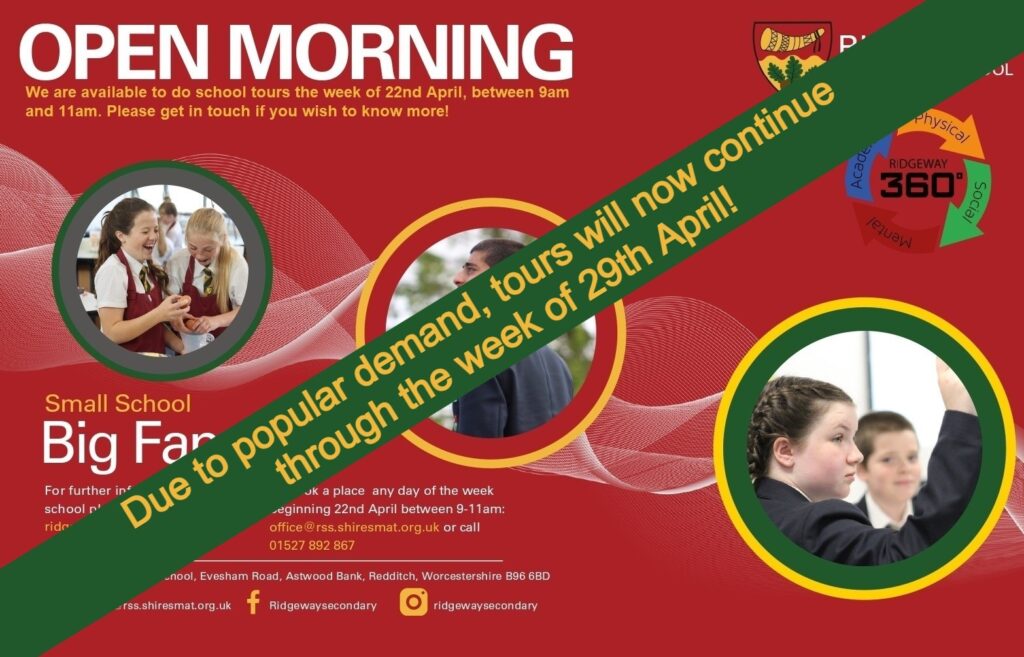CLICK HERE!
What do we study in History at Ridgeway?
Why do we study History?
We believe the history curriculum has a vital role in developing the whole child at Ridgeway Secondary School and fully supports Ridgeway 360°.
Our aim is to develop students’ curiosity about the past through exposing them to a wide range of British, European and World History. The history department at Ridgeway believe that students best develop as historians with a deep knowledge of the time period that they are studying. This firm grasp of the features and characteristics of the period allow students to confidently explore second order concepts such as change and continuity. Therefore, our curriculum has a focus on delivering knowledge, applying their learning and reviewing and retrieving their knowledge frequently.
Students are taught using authentic materials and sources wherever possible, allowing students to become familiar with challenging, sometimes archaic language and using the visual materials, pictures, portraits and cartoons that were available to people of the day. We also expose students to a variety of sources, such as archaeological evidence and artefacts. Schemes of work and lessons are designed around enquiry questions, pushing students to ask big questions about the past and to not be satisfied with simple answers. Students are encouraged in this by regular paired, group and discussion work to develop their argument skills.
History, however, goes beyond the academic and fully supports developing our students’ mental, social and physical skills as part of Ridgeway 360°. We want our students to emotionally engage with stories of the past in order to develop a personal connection with History. Our curriculum explores ways in which we can develop the whole child allowing them to argue, debate, challenge, empathise and understand their place in the modern world. We build the cultural capital of our students through developing an understanding of who we are, where we have come from and how actions from our past have imprinted on us, our values and the society in which we live in today
History programme of study at Key Stage 3 (Years 7-9)
At Key Stage Three, the history curriculum is designed to expose students to a broad narrative, covering the history of several time periods, places and peoples, in order to develop their chronological understanding. We aim to develop critical historical thinkers, able to handle evidence and interpretation in a skilful way, creating students who can discern for themselves the utility and reliability of information with which they are presented. Students will be able to assess causes of key events throughout history and gauge the extent of consequences. Subsequently, we aim to create knowledgeable citizens of the world who are familiar with different cultures, players and stories, able to be comfortable with the context of the world as they grow. We also ensure students are able to ‘think like historians’ by building in opportunities to engage with historical writing and reading.
Each year group will cover the following key questions as they move through KS3:
Year 7 – ‘Forging Foundations’
- Who are the ‘British’?
- How did the Norman Conquest impact on Britain?
- What would the people of the local area have experienced during the Middle Ages?
- ‘Her-Story’ – how have women changed history?
- How did the monarchy lose (and gain) power in the 15th and 16th centuries?
Year 8 – ‘Rights and riots’
- How ‘great’ was the ‘Great British Empire’?
- Did the Age of Enlightenment enlighten the people?
- How was slavery abolished?
- What impact did the Industrial Revolution have on Redditch?
Year 9 – ‘Woeful Wars’
- The War to end all Wars?
- Deadly dictators
- The Holocaust
- The impact of World War Two
- How ‘hot’ was the Cold War?
Year 9 history explores the key events of the twentieth century and is designed to help students understand the political, economic and social changes that took place. This not only allows students to develop a chronological and contextual understanding for the GCSE specification chosen, but also allows them to understand the landscape that exists today.
History programme of study at Key Stage 4 (Years 10-11)
At KS4, we have selected a specification (AQA) that we believe compliments the skill base and knowledge gained at KS3. The elements that we study are:
- Health and the People (an exploration of health throughout time in which we link explicitly to the physical element of Ridgeway 360°)
- Germany: Democracy to Dictatorship (an in-depth study of the Rise, and impact, of the Nazi Party)
- Elizabethan England (how religion and society changed under the rule of ELizabeth I)
- Conflict and tension: The Cold War (linking to the narrative explored in Year 9)
Homework expectations
Homework is an important aspect of the History curriculum. Not only does it offer the opportunity for students to consolidate their learning within lessons, but it also offers a chance for them to enhance their understanding of key topics and fundamental skills outside of the classroom. In line with school policy, at Key Stage 3 and Key Stage 4, students complete one piece of homework every two weeks. This will range from research tasks, flipped learning (using clips and videos to enhance their understanding), quizzes and preparation for assessment.
How can parents and guardians support at home?
There are a range of ways in which parents and guardians can help to support their child with developing their history knowledge and historical skills. This can simply be taking an interest in topics studied and explored or supporting with homework tasks. The local area is full of historical links so any trips out would also extend their learning!
Parents also have an important role in helping support with revision. Teachers will incorporate effective revision strategies into their teaching, particularly at KS4, but we are always grateful for the support offered at home to reinforce techniques.
Enrichment opportunities
An important element of Ridgeway 360 is developing the experience that our students have while at secondary school. The History Department are fully committed to enrich the curriculum beyond the classroom. Examples of how we do this are:
- Bi-annual history trip (Berlin/Krakow)
- Half-termly trips across year groups (Imperial War Museum, Black Country Museum, Warwick Castle, Hampton Court)
- In-school workshops (British Empire, trenches, life in Tudor/Stuart England)
- Other opportunities (competition, additional reading and ‘challenge’ homework tasks.


